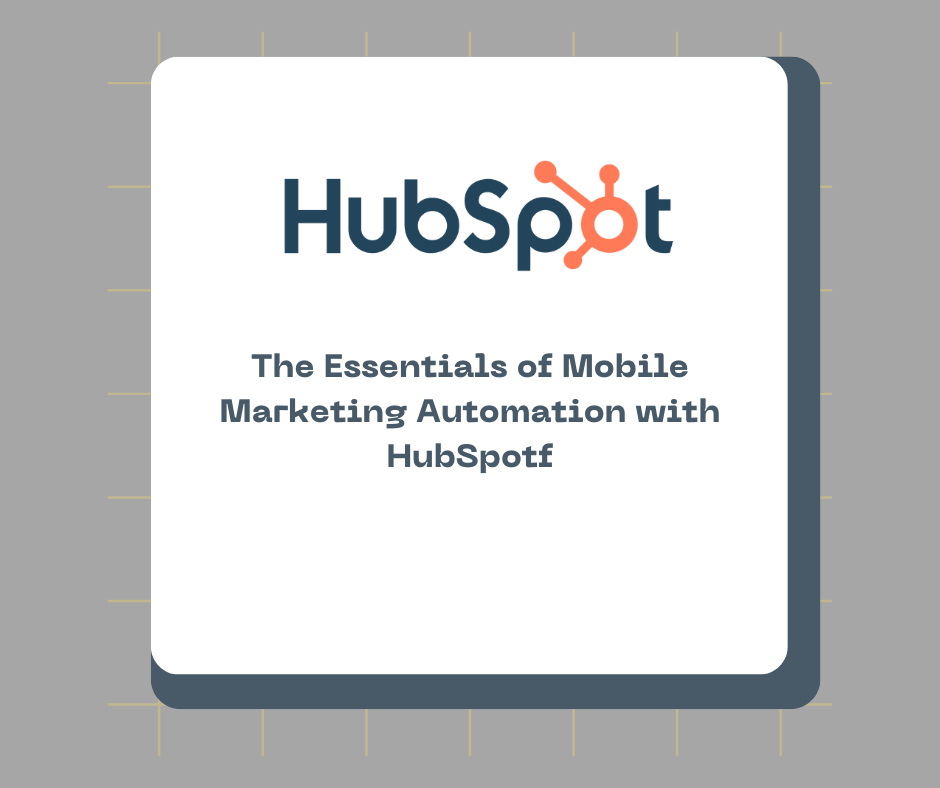In today's digital age, mobile devices have become ubiquitous, shaping the way consumers interact with brands and consume content. As mobile usage continues to soar, marketers are recognizing the need to prioritize mobile marketing strategies to reach and engage their target audience effectively. Mobile marketing automation, powered by platforms like HubSpot, offers a dynamic approach to engage mobile users, deliver personalized experiences, and drive conversions. In this comprehensive guide, we'll explore the essentials of mobile marketing automation with HubSpot, empowering marketers to unlock the full potential of mobile marketing.
Understanding Mobile Marketing Automation:
Mobile marketing automation encompasses the use of automated processes and tools to deliver targeted messages, personalized content, and timely interactions to mobile users. From SMS campaigns and push notifications to mobile-optimized emails and in-app messages, mobile marketing automation enables marketers to engage users across various touchpoints and devices seamlessly. HubSpot, a leading marketing automation platform, offers a suite of features and tools specifically designed to streamline mobile marketing efforts and drive results.
Essential Components of Mobile Marketing Automation with HubSpot:
- Mobile-Optimized Content Creation:
Creating mobile-optimized content is essential for engaging mobile users effectively. HubSpot's content creation tools enable marketers to design mobile-responsive emails, landing pages, and forms that adapt seamlessly to different screen sizes and devices. By prioritizing mobile-friendly design elements such as clear CTAs, concise copy, and fast-loading images, marketers can deliver a seamless user experience that encourages interaction and conversion.
- SMS and MMS Campaigns:
SMS (Short Message Service) and MMS (Multimedia Messaging Service) campaigns offer direct and immediate communication channels to reach mobile users. HubSpot's SMS marketing tools enable marketers to create and send personalized text messages to segmented lists of contacts, delivering timely updates, promotions, and reminders directly to users' mobile devices. By leveraging SMS and MMS campaigns, marketers can drive engagement, nurture leads, and drive conversions with minimal effort.
- Push Notifications:
Push notifications are an effective way to re-engage users and drive traffic to mobile apps or websites. HubSpot's push notification tools allow marketers to create and schedule targeted notifications that are delivered to users' mobile devices, even when they're not actively using the app. By leveraging personalized messaging, dynamic content, and segmentation capabilities, marketers can deliver relevant and timely push notifications that drive user engagement and retention.
- In-App Messages:
In-app messages provide an opportunity to engage users directly within mobile apps, delivering targeted content and promotions based on user behavior and preferences. HubSpot's in-app messaging tools enable marketers to create and deploy personalized messages that appear within the app interface, guiding users through the customer journey and prompting action. By leveraging in-app messages, marketers can drive conversions, promote new features, and enhance the user experience seamlessly.
- Mobile Analytics and Reporting:
Measuring the effectiveness of mobile marketing efforts is crucial for optimizing strategies and maximizing ROI. HubSpot's mobile analytics and reporting tools provide marketers with valuable insights into user engagement, conversion rates, and app performance. By tracking metrics such as app installs, user retention, and in-app interactions, marketers can identify trends, assess the impact of marketing campaigns, and make data-driven decisions to improve mobile marketing strategies.
Best Practices for Mobile Marketing Automation with HubSpot:
-
Segment Your Audience: Segmenting your audience based on demographics, behavior, and preferences allows you to deliver personalized messages that resonate with different segments of your audience.
-
Optimize for Mobile: Ensure that all content, including emails, landing pages, and forms, is optimized for mobile devices to provide a seamless user experience.
-
Test and Iterate: Continuously test different messaging strategies, CTAs, and content formats to identify what resonates best with your mobile audience and iterate accordingly.
-
Use Personalization: Leverage HubSpot's personalization features to deliver tailored messages and offers based on user preferences, behavior, and past interactions.
-
Monitor Performance: Regularly monitor the performance of your mobile marketing campaigns using HubSpot's analytics tools and adjust your strategies based on insights and data.
Conclusion:
Mobile marketing automation has emerged as a powerful strategy for reaching and engaging mobile users effectively. With HubSpot's suite of features and tools, marketers can create personalized, timely, and targeted mobile experiences that drive engagement, conversions, and brand loyalty. By embracing mobile marketing automation best practices and leveraging HubSpot's capabilities, marketers can unlock the full potential of mobile marketing and drive success in today's mobile-first world.
Schedule your training session here and comment “Need Training” on the request form.

Comments